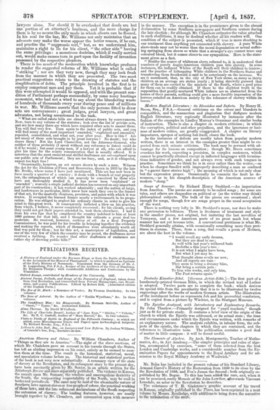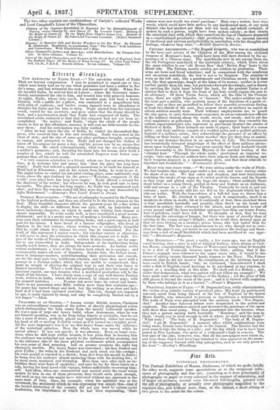PUBLICATIONS RECEIVED.
BOOKS.
A History of England under the Norman Kings, or from the Battle of Hastings to the Accession of the House of Plantagenet: to which is prefixed an Epitome of the Early History of Normandy. Translated from the German of Dr. J. M. Lappenberg, For. F.8.A., Keeper of the Archives of the City of Hamburg, By Benjamin Thorpe ; with considerable Additions and Corrections by the Translator.
Oxford Essays, contributed by Members of the University. 1857, Ancient Poems, Ballads, and Songs of the Peasantry of England, taken down from Oral Recitation, and transcribed from Private Manuscripts, rare Broadsides, and scarce Publications. Edited by Robert Bell. [Annotated edition of the English Poets.] The Ere of St. Hark : a Romance of Venice. By Thomas Doubleday. In two volumes.
The Rose of Ashurst. By the Author of "Emilia Wyndham," Re. In three volumes.
The Confulenee Ma,,: his Masquerade. By Herman Melville, Author of " Outoo,' "Types." Re. Authorized Edition.
Alma Theresa. By David liPCulloch.
The Life of Charlotte Bronff, Author of "Jane Eyre," "Shirley," " Villette," Re. By E. C. Gaskell, Author of" Mary Barton," Re. In two volumes. Visits to Fields of Battle in Engiand of the Fifteenth century; to which are added, some Miscellaneous Tracts and Papem upon Arehleological Subjects, By Richard Brooke, Esq., F.S.A.
Letters to John Bull, Esq., on Lawyers and Law Reform. By Joshua Williams, of Lincoln's Inn, Esq., Barrister-at-law, American Staerry and akar. By William Chambers, Author of "Things as they are in America."—The sight of the slave auctions, of which Mr. Chambers gave an account in his travels through the States, has left an abiding impression on his mind, calmly as he seemed to mention them at the time. The result is the historical, statistical, moral, and speculative volume before us. The historical and statistical portion of the book is not very new substantially. A summary view of the state of slavery at the Revolution' and its subsequent story to the present day, have been succinctly given by Mr. Senior, in an article written for the _Edinburgh Revicto and since separately published. The violence in Ramses,. the assault upon Mr. Sumner, the resolute and unscrupulous dexterity of the South, the temporizing respectability of the North, may be read in books and periodicals. The same maybe said of the abominable nature of Southern laws against slaves or free people of colour, the practical working of those laws, and the late vehement declarations of the South respecting the extension of slavery. The leading features however, are neatly brought together by Mr. Chambers, and commented upon with measure in the manner. The exception is in the prominence given to the absurd declamation by some Southern newspapers and Southern orators during the late election ; for although Mr. Chambers estimates the value attached to such ebullitions, it may be doubted whether all his readers will. One condition of the subject is presented, which if true is more shocking to our sentiment than anything yet connected with slavery. A pure White slave-trade may not be worse than the moral degradation or actual suffering springing from slaves so white theta stranger's eye cannot trace any coloured blood, but it comes closer to our sympathies. Here is the statement given as a fact. "Besides the source of whiteness above referred to, it is understood that numbers of purely Anglo-American children pass into slavery. In some instances, the indigent Whites of the Southeell their children to traders ; and the practice of kidnapping White children in the Northern States and transferring them Southward is said to be notoriously on the increase. We see it mentioned, that, in the city of New York alone, as many as thirty children on an average are stolen yearly ; it being shrewdly guessed that many of them are carried to the markets of the South, where a good price for them can be readily obtained. If there be the slightest truth in the supposition that gently-nurtured White infants are so abstracted from the homes of their parents, nothing could give a more forcible impression of the horrors entailed on American society by the tolerance of slavery within its bosom."
Modern English Literature: its Blemishes and Defects. By Henry H. Breen, Esq., E.S.A.—General criticisms on the errors' and blunders in composition, and the mannerism and plagiarism that disfigure modern English literature, very copiously illustrated by instances after the fashion of the examples in Lindley Murray's Grammar and similar books of instruction. There is also a chapter on modern criticism ; in which the corruption, political and other prejudices, and the ignorance or laziness of modern critics, are greatly exaggerated. A chapter on literary impostures, apropos of nothing but itself, closes the book. As the instances of defects are mostly taken from popular modern writers, there is an interest in the examples greater than might be expected from such minute criticism. The book may be perused with advantage for its lessons on composition ; though Mr. Breen sometimes overdoes his work, expecting a precision, in complex sentences, which cannot be practically attained except in inflected languages with terminations indicative of gender, and not always even with such tongues in practice. Sometimes we think he is in error rather than the writer,—as when he charges Smollet with improperly describing a man as confined in "a garret three stories high" ; the meaning of which is not only clear but the expression proper. Occasionally he commits the fault he denounees,--as in his slangish description of the American sources of modern "slang."
Songs of Summer. By Richard Henry Stoddard.—An importation from America. The poems are scarcely to be called songs ; for some are tales, and others are rhapsodies on political or (as the writer may think) philosophical subjects. The bulk of the pieces are occasional ; short enough for songs, though few are songs proper in the usual acceptation of the word.
There is nothing very lofty in Mr. Stoddard's muse, nor does he make any pretension to loftiness. There is freshness of treatment and style in the smaller pieces, not original, but imitating the last novelties of Tennyson, and a few American poets of no great mark but whose manner has not yet become trite. A conventional prettiness is what Mr. Stoddard generally attains, with occasionally something more than prettiness in stanzas. These, from a song, that recalls a poem of Holmes, are about the best in the volume.
"I would recall my early dreams,
But they are dead to me ; As well with last year's withered buds Reclothe a this year's tree : It is not what I might have been, But what I yet may be.
That thought alone avails me now,
And all regrets are vain :
They seem to bring a dreamy bliss,
But bring a certain pain : To him who works, and only him,
The Past returns again."
Deutsche Iiinstler-Bibel. [German .Artist-Bible.]—The first part of a handsomely-printed German Bible, in which the revised text of Luther is adopted. Twelve parts are to complete the book; which derives its special title from the peculiarity that it is to be illustrated by twelve engravings after the works of modern German artists. The illustration of the instalment before us represents Job and his proverbial comforters, and is copied from a picture by Wachter, in the Stuttgart Museum.
The Epistles Analyzed, with Introductory and Explanatory Remarks. By John Thurlow.—Primarily designed for "pupil teachers," though just as fit for private study. It contains a brief view of the origin of the church to which the Epistle was addressed, or its actual state ; the time and circumstances under which the Epistle was written, with remarks of an explanatory nature. The analysis exhibits, in tabular form, the subjects of the epistle, the chapters in which they are contained, and the references to illustrative tests. The publication contains a good deal of matter in little compass : it will be found useful.
The Elements of Algebra. By Arch. Montgomerie, Teacher of Mathematics, &c., in Ayr Academy.—The simpler principles and rules of algebra, accompanied by exercises, "some of them selected from the beet London and Cambridge works, and a considerable number from the Examination Papers for appointments to the Royal Artillery and for admission to the Royal MiliMry Academy at Woolwich."
Mr. Bohn has included in the present volume of his Standard Library, Armand Carrel's History of the Restoration from 1660 to its close by the the Revolution of 1688, and Fox's James the Second ; both originally republished by Mr. Bogue. To this has been added the rare, and, when it can be procured, costly Memoir of Sir John Lowther, afterwards Viscount Lonsdale, an actor in the Revolution he describes.
The substance of T. H. Gladstone's graphic account of his travel in Kansas, originally published in the Times, has been reprinted in a neat volume by Messrs. houtledge, with additions to bring down the narrative to the termination of the strife, The two other reprints are continuations of Carlyle's collected Works and Lord Campbell's Lives of the Chancellors.
History of the Counter-Revolution in England for the ReAstablishment of Papery, under Charles II. and .Tennes if. By Armand Carrel. History of the Reign of James II. By the Right Hon. Charles James Fox. Afetnoir of the Reign of James IL By John Lord Viscount Lonsdale. (Bohn's Standard Library.) Kansas; or Squatter Life and Border Warfare in the Par West. By Thomas H. Gladstone. Reprinted, by permission, from " The Times," with Additions and Corrections. With Illustrations and a Map.
Oliver Gromwelts Letters and Speeches ; with Blacidations. By Thomas Carlyle. In three volumes. Volume II.
Lives of the Lord Chancellors and Keepers of the Great Seal of England, from the Earliest Times till the Reign of King George IV. By John Lord Camp
bell, LL.D., F.R.S.E. Fourth edition. In ten volumes. Volume IV.



































 Previous page
Previous page